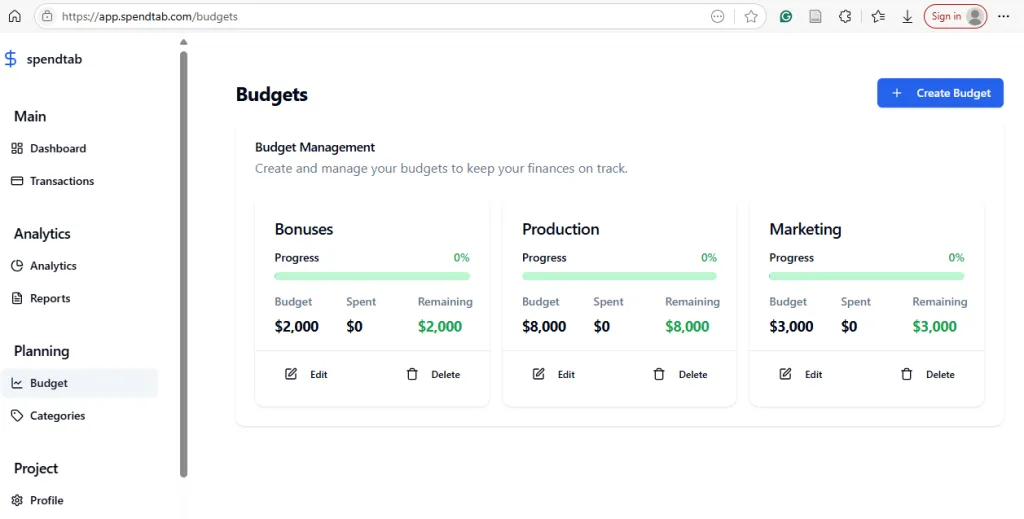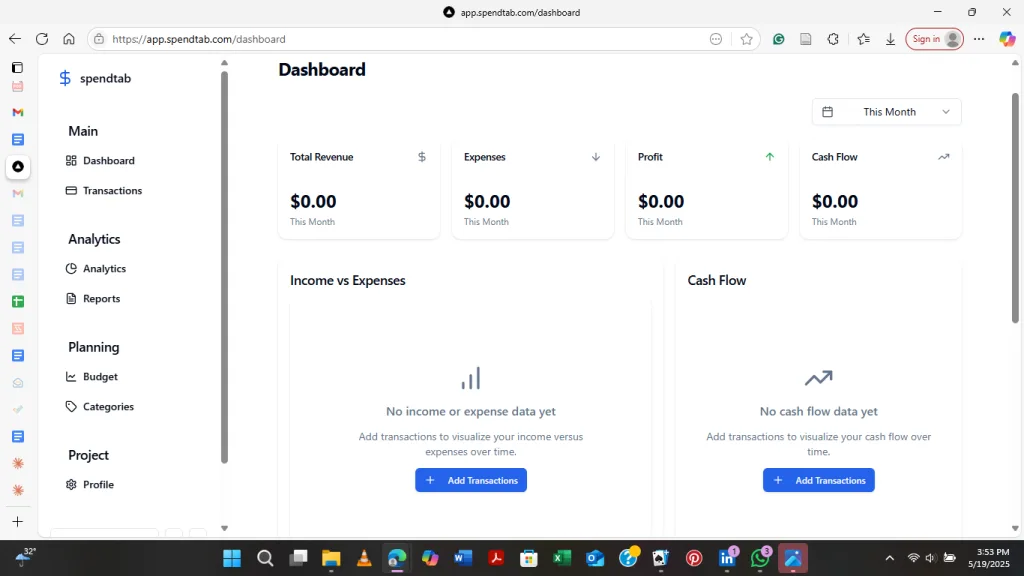
Effective project cost tracking is essential for maintaining profitability and ensuring sustainable growth in today’s fast-paced business environment. Yet despite the abundance of budgeting applications on the market, many businesses continue to struggle with budget management challenges that impact their bottom line. Recent studies indicate that nearly 65% of business projects exceed their initial budgets, with an average overrun of 27% – a statistic that highlights the widespread ineffectiveness of current budgeting solutions.
Enter Spendtab, a revolutionary project cost tracking software designed specifically to address the unique financial management needs of businesses. Unlike conventional budgeting apps that fail to accommodate the complexities of project-based operations, Spendtab offers a comprehensive suite of tools tailored to give businesses complete control over their financial resources. This article explores why traditional budgeting applications fall short for business users and how Spendtab’s innovative approach is transforming project financial management across industries.
The Common Pitfalls of Traditional Budgeting Apps
One-Size-Fits-All Approach
The fundamental problem with most budgeting applications is their customer- focused design. Finance apps, even when marketed to businesses, typically approach budgeting from an individual user perspective. They’re built around concepts like monthly recurring bills, discretionary spending categories, and personal savings goals – paradigms that simply don’t align with how businesses manage project finances.
For businesses operating on project-based models, financial management involves tracking costs across multiple concurrent projects, each with its timeline, team members, and budget parameters. Traditional apps force businesses to adapt their workflows to fit within rigid application structures, rather than providing tools that naturally complement existing business processes.
A construction company managing simultaneous building projects, for instance, faces entirely different budgeting challenges than a household managing monthly expenses. When project managers attempt to track construction material costs, subcontractor payments, and regulatory compliance expenses using conventional budgeting tools, they quickly discover gaps that lead to financial miscalculations and operational inefficiencies.
Lack of Project-Specific Features
Project cost tracking requires specialized capabilities that generic budgeting applications typically lack. Without features designed explicitly for Project-Financial-Management, businesses resort to cumbersome workarounds that introduce errors and consume valuable time.
Most budgeting apps fail to offer critical project management functions such as milestone-based budget allocation, resource utilization tracking, and variance analysis. They lack provisions for handling project-specific financial elements like client change orders, contingency funds, and phased payment schedules. This deficiency forces businesses to cobble together solutions using spreadsheets and multiple applications, creating information silos that obscure the true financial status of projects.
Furthermore, traditional budgeting apps rarely accommodate the collaborative nature of business project management. They typically limit access to a single user or offer rudimentary sharing capabilities that don’t reflect the hierarchical requirements of business teams. When multiple team members need to input expenses, allocate resources, and review financial data with varying levels of authority, consumer-oriented apps simply can’t meet these complex needs.
The Real Cost of Ineffective Budget Tracking
Financial Consequences
The direct financial impact of inadequate project cost tracking extends far beyond simple budget overruns. When businesses lack visibility into their project finances, they experience cascading effects that damage profitability at multiple levels.
Inaccurate cost tracking leads to errors in pricing strategies. Without a clear understanding of the true costs associated with delivering products or services, businesses either underprice their offerings, sacrificing profit margins, or overprice and lose competitive positioning in the market. A recent industry analysis revealed that companies using inadequate project budgeting tools experienced an average profit margin decrease of 12% compared to competitors with robust financial tracking systems.
Cash flow management also suffers when project expenses aren’t properly monitored. Unexpected costs arise without warning, creating financial strain that can necessitate emergency funding at unfavorable terms. For small and medium-sized businesses, these sudden cash demands can threaten operational continuity and limit growth opportunities.
Perhaps most significantly, poor project cost tracking makes it nearly impossible to perform accurate post-project analysis. Without detailed financial records tied to specific project components, businesses cannot identify which aspects of their operations deliver the highest return on investment and which require optimization, a critical deficiency that perpetuates inefficient practices and prevents continuous improvement.
Operational Inefficiencies
Beyond direct financial losses, ineffective budget tracking creates operational drag that diminishes productivity throughout an organization. Project managers spend an inordinate amount of time assembling financial reports from disparate sources rather than focusing on value-adding activities. According to workplace efficiency studies, managers at companies without dedicated project cost tracking software spend approximately 7.5 hours per week on budget-related administrative tasks that could be automated with the right tools.
Decision-making velocity also decreases when financial data isn’t readily available. In competitive industries where agility is crucial, delayed access to accurate cost information creates bottlenecks that extend project timelines and reduce market responsiveness. When approvals for additional resources or scope changes require days of financial analysis rather than minutes, project momentum falters and client satisfaction suffers.
Team dynamics are equally affected by poor budget management tools. Without clear visibility into financial parameters, project teams operate in an information vacuum that breeds uncertainty and inhibits proactive problem-solving. This lack of transparency often creates tension between departments as they compete for limited resources without understanding the broader financial context of their requests.
Missed Business Opportunities
Perhaps the most insidious cost of ineffective budget tracking is the opportunity cost of projects not pursued and innovations not implemented. Without reliable financial data from past projects, businesses lack the confidence to venture into new markets or experiment with innovative approaches. Risk assessment becomes unnecessarily conservative when financial projections are based on incomplete or inaccurate historical data.
Competitive bidding processes particularly highlight this disadvantage. Companies using inadequate budgeting tools consistently prepare less accurate proposals than their better-equipped competitors. They either include excessive contingencies that inflate their bids or underestimate costs and commit to unprofitable contracts. Either scenario puts them at a significant disadvantage in winning profitable business.
Strategic planning likewise suffers from poor financial visibility. Annual budgeting becomes a guessing game rather than a data-driven process, and resource allocation decisions lack an empirical foundation. Without a detailed understanding of project profitability factors, businesses struggle to identify their optimal market positioning and fail to capitalize on their unique strengths.
Introducing Spendtab – The Business Budget Solution
Purpose-Built for Project Cost Tracking

Spendtab represents a fundamental departure from conventional budgeting applications by prioritizing the specific needs of project-based businesses. Its architecture is built around the project as the primary organizational unit, mirroring how businesses structure their operations rather than forcing artificial adaptations to consumer-oriented models.
The platform’s design philosophy places equal emphasis on financial accuracy and operational usability, recognizing that project cost tracking software must seamlessly integrate into daily workflows to deliver maximum value. Every feature has been developed through extensive consultation with project managers across industries to ensure alignment with real-world business processes.
Unlike general-purpose budgeting tools, Spendtab acknowledges the multi-dimensional nature of business finance. It facilitates tracking across multiple simultaneous projects while maintaining consolidated oversight of organizational financial health. This dual perspective enables both granular management of individual project budgets and strategic analysis of overall business performance – a capability notably absent in traditional applications.
Core Features That Make the Difference
Spendtab’s feature set directly addresses the shortcomings of conventional budgeting applications, beginning with its real-time expense tracking capabilities. Project team members can log costs from anywhere via mobile or desktop interfaces, instantly updating project financial status. This immediacy eliminates the information lag that plagues traditional systems and enables proactive budget management rather than retrospective analysis.
The platform’s collaborative architecture supports complex organizational structures with role-based permissions that maintain financial governance while facilitating team participation. Department heads, project managers, financial controllers, and executives each receive customized interfaces displaying relevant information and controls appropriate to their responsibilities. This granular access control ensures financial transparency without compromising security or overwhelming users with unnecessary details.
Perhaps Spendtab’s most transformative feature is its dynamic budget modeling system. Unlike static budget templates found in traditional applications, Spendtab enables scenario planning that helps businesses anticipate financial outcomes under various conditions. Project managers can model the impact of schedule changes, resource adjustments, or scope modifications before implementation, identifying potential issues when they’re still theoretical rather than after they’ve affected the bottom line.
The platform also includes automated threshold alerts that notify stakeholders when projects approach predefined budget boundaries. These early warning systems prevent cost overruns by making financial concerns visible before they become financial problems. When paired with Spendtab’s variance analysis tools, these alerts enable businesses to implement corrective measures proactively rather than reactively.
Spendtab: Business Transformations
Industry-Specific Applications
Spendtab’s flexible architecture enables implementation across diverse business sectors including tech, construction, energy, etc, each benefiting from its core project cost tracking capabilities while leveraging industry-specific configurations.
In the technology sector, software development companies can use Spendtab to track costs against agile development sprints, maintaining budget visibility despite the iterative nature of their projects. The platform’s integration with project management tools allows automatic financial updates as tasks progress through development workflows, creating unprecedented alignment between technical and financial perspectives.
Professional service firms, including legal practices and consulting agencies, can leverage Spendtab’s multi-dimensional tracking to monitor both client project profitability and internal cost center performance. By connecting billable activities directly to project budgets, these organizations gain immediate visibility into service delivery efficiency and client relationship profitability.
Event management companies represent another potential implementation category, using the platform to track complex event budgets with numerous vendors, venues, and variable costs. The software’s scenario planning capabilities prove particularly valuable in this sector, allowing event planners to model financial implications of attendance variances, vendor changes, or scope modifications well before financial commitments are finalized.
Implementing Spendtab for Your Business
Getting Started Guide
Transitioning to Spendtab is easy, sign up to the desired plan, input your data and access every resource available to make project cost tracking as easy as possible.
Measuring Success
Implementing project cost tracking software represents a significant investment, making success measurement essential for validating the decision and guiding ongoing optimization.
Budget accuracy serves as a primary success metric, with organizations typically seeing dramatic improvements within their first quarter using dedicated project cost tracking software. Spendtab’s historical comparison tools allow businesses to track their budgeting precision over time, demonstrating the concrete financial benefits of enhanced project cost visibility. Industry research suggests that companies implementing robust financial tracking systems can reduce average budget variances from 15-20% to under 5%.
Perhaps most significantly, Spendtab enables businesses to measure improvements in strategic decision quality. By comparing project selection and resource allocation decisions made with comprehensive financial data against historical patterns, organizations can quantify the impact of enhanced information access on business outcomes. This long-term perspective positions Spendtab as not merely a tactical tool but a strategic business asset.
Conclusion
The widespread failure of traditional budgeting applications in business environments stems from their misalignment with project-based operational models. Consumer-oriented design approaches, and limited collaborative capabilities, create significant gaps that undermine financial control and strategic decision-making.
Spendtab’s purpose-built project cost tracking software directly addresses these shortcomings by providing a comprehensive platform designed specifically for project cost management. From real-time expense tracking and team collaboration tools to seamless system integration and customizable workflows, Spendtab delivers the capabilities businesses need to maintain financial control across complex project portfolios.